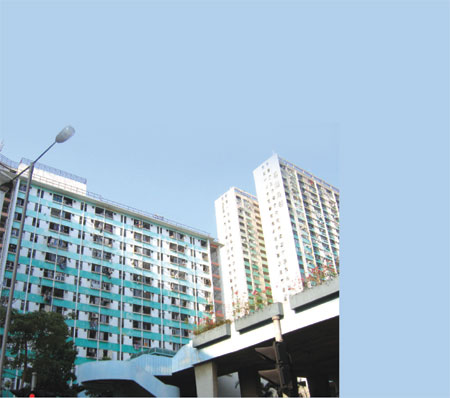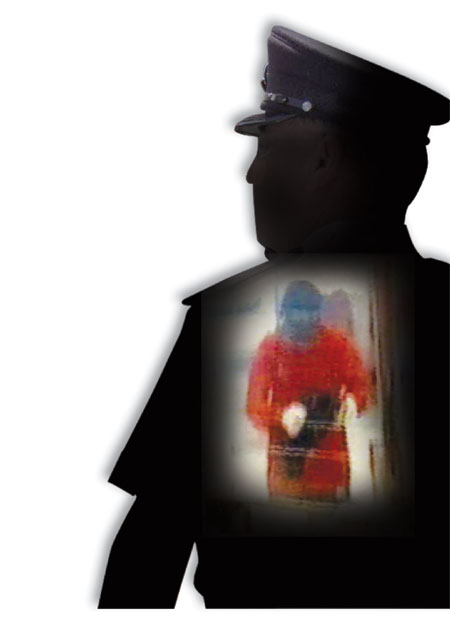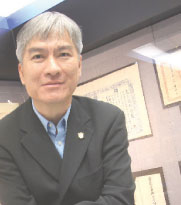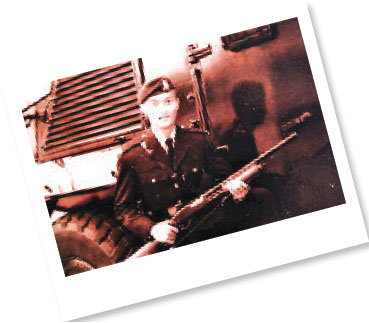Killer cops
Updated: 2011-08-18 09:10
By Lam Kin-keung(HK Edition)
|
|||||||
|
The Shek To House in Shek Wai Kok Estate, a public housing located in Tsuen Wan, has seen some serious criminal crimes. Provided to China Daily |
|
A snapshot of a CCTV vediotape showing the rogue cop Tsui Po-ko robbing the bank. Provided to China Daily |
|
Lam Kin-keung is a retired detective station sergeant who served the Hong Kong Police Force for 34 years. He worked at the Organized Crime and Triad Bureau from 1997 to 2005 after serving with regional intelligence and regional crime among other units. Lam is recognised for his skill in intuiting the minds of criminal suspects and his leadership in different kinds of criminal cases. He was awarded the Hong Kong Police Medal for Meritorious Service in 2009. Edmond Tang / China Daily |
A veteran police investigator looks back on one of Hong Kong's most violent criminals, a rogue cop who took the lives of three of his peers before a gunshot ended his criminal career. Lam Kin-keung writes.
There was a police raid on a public housing estate earlier this month. In the midst of the chaos five police, attached to anti-triad units, were injured by flying bricks thrown by residents. Five people were arrested, various weapons and drugs were seized.
The incident reminded me of an incident several years ago, when a serious crime took place in that very same building.
It was on March 14, 2001, during my fourth year, with the Organized Crime and Triads Bureau. I got an urgent call about shots fired at Tsuen Wan. I was ordered to assist with the investigation.
There was blood in the narrow corridor of Shek To House in Shek Wai Kok Estate when I got there. Bloody footprints on the wall attested to the painful death struggle that had obviously taken place. Several shots had been fired. The personal belongings of a young patrol officer were scattered about the scene.
As a police officer, I was struck immediately by a mix of sorrow, pity and fury, to see one of my colleagues, so brutally, so cruelly murdered.
The crime had been meticulously plotted. It was executed with a zeal intent on taking the life of another human being.
The perpetrator first filed a false complaint to the police about a noisy disturbance at the building. As the young officer responded to the call, and approached the complainant's door, the killer threw open the door, and began a furious attack, catching his victim unawares. The assailant snatched up the fallen officer's service revolved and fired four shots, point blank at the officer's head, before fleeing with the weapon still in his hand.
The brutal murder shocked Hong Kong but it was only the beginning of a series of criminal acts that became the focus of the biggest criminal investigation in the city's history.
Before the series of events had fully unraveled, feelings of public outrage deepened, when the killer was later identified as Tsui Po-ko, himself a police constable. His crimes are part of the worldwide annals of law enforcement, concerning police officers who kill fellow officers with malice. Tsui's case has become an important part of the literature - his criminal psychology widely studied.
I had wondered as I stood that day, surveying the tragedy that unfolded whether this vicious crime might have been committed by a police officer. I found even further evidence to support my speculation after Tsui committed two more crimes.
Tsui was well aware of patrol operations and of police discipline. He chose to commit crimes at noon when patrol officers are required to take their lunch breaks by turns back at the police station. It was a time of the day when the manpower on the streets was relatively weaker than at other times of the day.
On December 5, 2001, Tsui, whose identity was still not known to police, robbed a bank at a private housing estate in Tsuen Wan. He shot and killed a security guard, using the weapon he had seized at the time he murdered the young officer. The bank robbery and the slaying of the security guard took place in a time span of a mere one minute and 18 seconds.
My investigative team and I studied the CCTV recording of the bank many times and were struck by how Tsui was able to manipulate the weapon with tremendous agility and calm, his deftness and the remarkable strength he demonstrated when leaping onto the counter, climbing up and down from the uncapped glass, then fleeing swiftly. In that remarkably short period of time, the gunman was able to make off with HK$500,000 cash. There was no question in our minds that this violent criminal was no ordinary thug. He was a professional.
Five years passed before he struck again. Strangely, he took it upon himself to challenge two police officers, with only three bullets remaining in the weapon with which he had committed his previous two crimes. My guess was he took the risk to try to secure more weapons, more bullets to commit further crimes.
He struck at dawn, on March 17, 2006. Two patrol officers had stopped to record their patrol in a book set at the threshold of a pedestrian tunnel in Tsim Sha Tsui. Tsui opened fire from ambush.
It appears Tsui may have adjusted a mirror in the tunnel, so that he could have a clearer view of the officers' movements.
One of the patrol officers fell, mortally wounded. The second was seriously wounded, yet that officer, suffering a life-threatening wound was able to unholster his weapon and return fire, leaving Tsui mortally wounded. The mystery of this bizarre character however remained. The rogue cop was dead and would never be brought to trial but the evidence, supported by the fact that a single firearm was used in all three crimes led to the conclusion that all three crimes had been committed by Tsui.
The case was so complex that it took the Coroner's Court more than 30 days to complete inquests into all three crimes. The court eventually found that Tsui was the perpetrator of all three crimes and that he was shot and killed lawfully by the police.
We asked for a police clinical psychologist, an FBI investigator from the USA, an Australian criminologist and a forensic psychiatrist to submit professional analyses to the court just to try to grasp the progression of Tsui's mind into criminal psychopathology.
Tsui had won the Silver Whistle Award at the police training school. He performed well in a written test for promotion, and won a HK$60,000 prize participating in a television game show.
Tsui had experienced self-fulfillment, from these notable successes, but none prevented the deterioration of his mental condition. Maybe it was his "go-getter" personality that presented him with the challenge that twisted his thoughts and finally led him along the path to serious, violent crime.
To this day, I cannot stop asking why did a policeman - a law enforcer sworn to uphold justice - become such a ferocious killer. Why was a policeman who continued to carry out regular duties, so bent on committing violent crimes against his peers when he was off duty? Why did this policeman, judged to have been a talented officer with potentials, become what the public came to call "a devil cop"?
I don't think it was just a matter of money. Tsui may have tried hard to uphold his own values - but in the end he took to murdering his peers and robbing a bank, giving him feelings of success for acts which he could never share with others and which in the end, cost him his life.
Andrea Deng contributed to this story.
|
Leung Shing-yan, a 24-year-old patrol man who was killed by Tsui Po-ko in Tusen Wan on March 14, 2001. Provided to China Daily |
(HK Edition 08/18/2011 page4)



